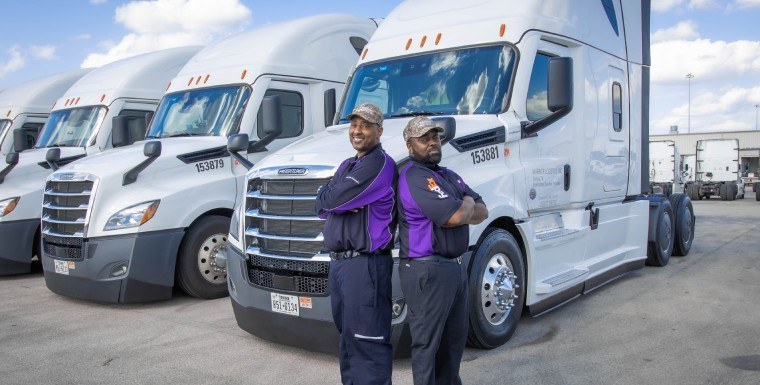Obviously truck drivers need to be safe. But do truck drivers get drug tested, and if so, how often?
Federal law and the Department of Transport focus heavily on safety, and one aspect of that is drug testing for CDL (Commercial Driver License) holders. But what about truck drivers who don’t have a CDL? Do state or federal laws, or any requirements of the Department of Transport (DOT), cover them?
I’m going to cover everything you need to know. I’ll tell you when truck drivers could get drug tests, how often truck drivers can get drug tests, and cover all the legal aspects for CDL and non-CDL drug testing.
What Vehicles & Drivers Require A CDL (Commercial Drivers License)?
The first thing I want to do here is just clarify which vehicles and drivers are covered by the Department of Transport regulations, and require a commercial driver’s license to operate them.
These are the conditions:
- A gross vehicle weight rating of 26,001 pounds greater
- Hose a trailer with a GVWR of greater than 10,000 pounds
- A vehicle designed to carry 16 or more passengers
- Carries hazardous weight requiring a placard
So any driving jobs in those categories require a CDL and will be covered by the drug and alcohol testing rules that are laid out by the FMCSA (Federal Motor Carrier Safety Administration), which is part of the Department of Transport.
Are Non-CDL Truck Drivers Drug Tested Under Federal Law?
Now we have covered the types of drivers who are drug tested under federal law, what about non-CDL truck drivers?
The answer is no. They are not covered by the same federal regulations, so does that mean they aren’t drug tested?
As with any employee, the employer can still implement company policies on drug use and drug testing, including alcohol use. In addition to that, state laws may come into play here, which may implement testing requirements for non-CDL drivers, especially in safety-sensitive areas of society.
So if you are in this position, but aren’t sure about testing, then you need to check with the employer or check state law.
State Law Vs Federal Law: Who Wins?
There is a “supremacy clause” in the US Constitution that dictates that federal law always beats state law. There are obvious reasons for that.
This is particularly pertinent nowadays when many states have relaxed or legalized cannabis use. That could make it problematic for CDL truck drivers who fail a drug test due to marijuana use, if it’s completely legal to use and they aren’t under the influence at work.
But marijuana is still illegal at the federal level, which means drug testing carried out under FMCSA regulations must still test for it and still react to failure as for any other drug.
- Federal law always beats state law
- Local legalization means nothing
- All CDL truck drivers are treated equally
- Failure always has the same consequences
When Could A CDL Truck Driver Be Tested?
So do truck drivers get drug tests? Yes, definitely if they are CDL carriers, and almost definitely as well under employer regulations, because companies need to show due care in case of legal backlash.
So now let’s talk about the circumstances under which a CDL holder will be tested, as laid out by the Federal Motor Carrier Safety Administration.
- Pre-employment drug testing
Before you are employed in a regulated industry role, then you must pass a drug test as part of the pre-employment process. Note that alcohol testing isn’t mandatory during recruitment or onboarding.
- Random testing
In contrast to most industries nowadays, CDL holders are still subject to stringent random testing regimes. FMCSA regulations state that at least 50% of the drivers employed must be randomly tested every year, and 10% must be randomly tested for alcohol per year.
- Testing on reasonable suspicion grounds
If your supervisor/employer has valid grounds then they can carry out reasonable suspicion drug testing. This is based on specific federal guidelines around changes in behavior, speech, appearance, body odor, or situation.
- Post-accident testing
If you are involved in an accident, then you will sometimes face a drug test. But there are specific criteria under CDL guidelines for when you would be tested. When there’s a fatality, medical treatment away from the scene is required, or there is disabling damage to any vehicle involved. Alcohol testing must be completed within eight hours, and drug testing within 32 hours of the incident.
- Return to duty & follow-up
After you return to work, either from an accident or failing a drug test and going through a rehabilitation program, then you must be drug tested again before you can resume your work duties. There is a return to duty process, which involves working with a substance abuse professional, which must be followed to get you back to work.
What Happens If A CDL Driver Fails A Drug Test?
Look, you don’t need me to tell you that if you are a CDL driver and you fail a drug test then you are going to face significant consequences that could be far-reaching, depending on the circumstances.
This is the process for a first offense:
- Immediate suspension
- Return to duty process followed
- Follow-up testing required
- Substance abuse professionals involved
Note that in some situations, a CDL driver could lose their job, or their license, even for a first offence. Severity and situation matter.
If you have returned to work and then fail a subsequent drug test, then I can pretty much guarantee that it will result in the removal of your license and the loss of your ability to work in any federally regulated driving position ever again.
What Type Of Drug Test Do Truck Drivers Take?
Federal regulations are very clear about the drug test used. It is the Department of transport stated criteria as well, for all people covered by their general regulations.
It’s always a 5 panel drug test, the industry standard one that is also used widely by most companies, that looks for the following substances:
- Cannabis
- Cocaine
- Amphetamines/methamphetamines
- Opiates
- PCP
I find that quite interesting because it’s a very limited number of substances, which doesn’t really take into account things like novel cannabinoids, new synthetic drugs, and less well known substances. In terms of alcohol, a commercial driver’s license holder will fail if they have a blood alcohol concentration of 0.04+ when tested.
It’s really vital to note that even if cannabis and other cannabinoids are completely legal in your state, to remember that federal law wins, and in terms of CDL drivers, it’s still illegal and will still lose you your job.
How Often Do Truck Drivers Get Drug Tested?
As I said earlier, 50% of the company’s drivers must be tested annually. In addition, 10% must be tested for alcohol. So at a minimum, once every two years.
But it’s important to no that in these safety-sensitive industries, a lot of companies go further. Not only to maintain federal contracts and keep a good reputation, but also for insurance costs and being able to show good practice if legally challenged.
Anecdotally, most CDL drivers are tested annually at some point, and you won’t know when because it’s always random.
Note as well what I said earlier about suspicion testing. As long as it’s documented and follows the guidelines (and how would you prove you are being persecuted against an on the spot opinion?), then you could face additional short-notice tests, depending on your supervisor or relationships.
Can You Hide Drug Use From A CDL Drug Test?
So now you know that yes, truck drivers do get drug tested, and you know how often they get drug tested, let’s talk about how you could beat this drug test.
We know it’s a 5 panel standard urine drug test. It’s also an unsupervised test. This means nobody will be in the room with you, so you won’t be directly observed submitting your sample into the cup.
Here are your options:
- Smuggle in a sample of high-quality synthetic urine. This is your best chance of passing, and as the test is unsupervised, is very low risk. Use Quick Luck for the best chance. Click here to buy Quick Luck urine.
- If you don’t want to smuggle in a fake sample, then use Rescue Cleanse detox drink. It will flush out drug metabolites faster than you can naturally, to leave you clean for a few hours during which you can submit a clean sample. Note that it’s only a masking agent, and you won’t get clean permanently. Click here to buy Rescue Cleanse from Testnegative.
- The third option is to get fully clean, or as clean as you can. Use Toxin Rid detox pills to accelerate the body’s natural eradication process of toxins. This will leave less drug metabolites in your body on the day of your test, and you can then use Rescue Cleanse – which will then stand a better chance of masking what’s left for enough time to submit a clean sample. To buy Toxin Rid, visit Testclear.




